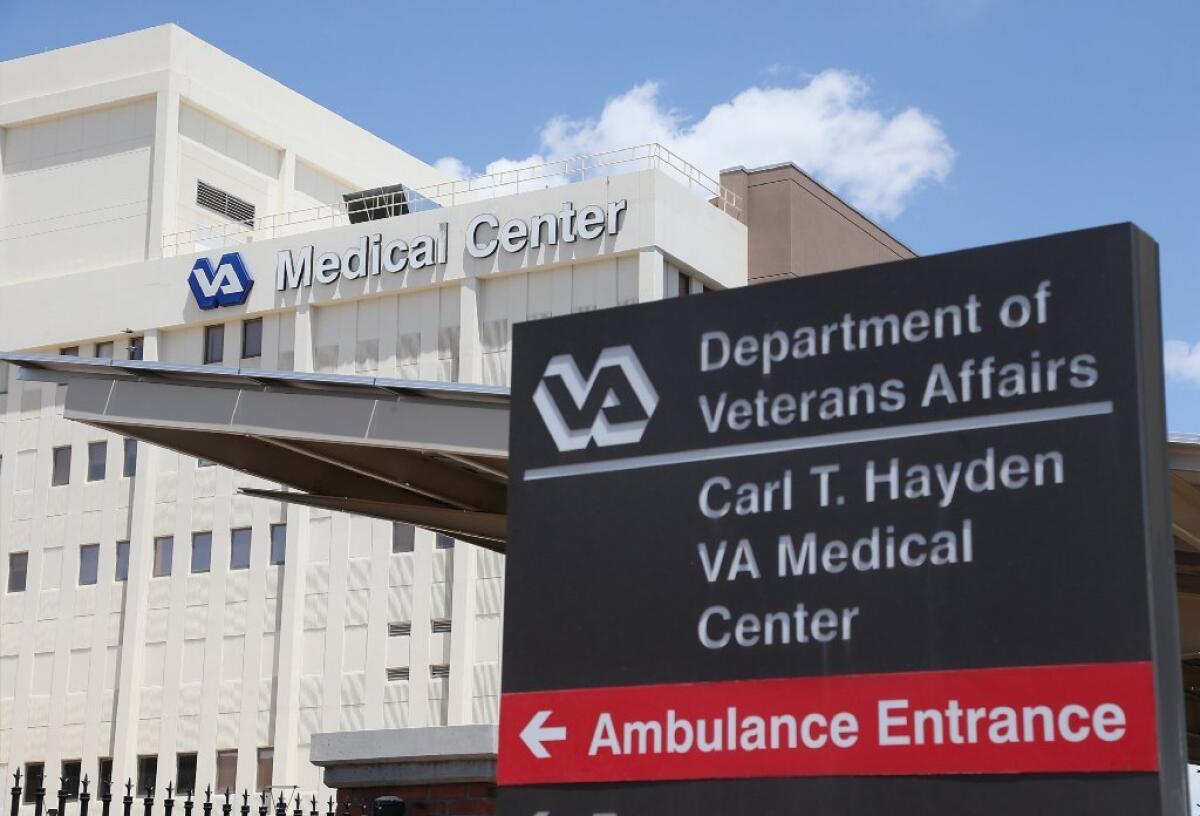Long wait times and schedule manipulations persist at Phoenix VA hospital, watchdog says

- Share via
Reporting from Phoenix — When President Obama visited the Department of Veterans Affairs hospital here last year, he proclaimed a new day for the troubled facility, which was the epicenter of a nationwide scandal in which waiting lists were manipulated to hide long delays in care for veterans.
“We’ve brought in a new team that has been tackling these issues to make sure that wait times for scheduling, access to providers, is greatly improved,” Obama said after a facility tour in March 2015.
This week, more than two years after the scandal was exposed, the VA’s watchdog concluded that the problems in Phoenix have not been fixed.
The hospital system is still manipulating scheduling data, unilaterally canceling appointments and forcing some patients to wait nearly a year for care, according to a report by the VA Office of the Inspector General.
In one case, a delay in care may have contributed to the death of a veteran, the investigation found.
That patient, a 58-year-old man, came to the Phoenix hospital in May 2015 complaining of chest pain and was told he needed a stress test within a week. None was ever scheduled. The man was found dead the next month of advanced heart disease.
“Timely testing may have indicated that the patient had significant disease and could have prompted further definitive testing and interventions that could have forestalled his death,” the watchdog’s report said.
Another 214 patients died between January 2015 and this September while waiting for appointments, but investigators did not link their deaths to delays in care.
Currently, about 38,000 veterans have been waiting more than 125 days for an appointment. That is 3,000 more than when the scandal broke in 2014.
Reacting to the report, Sens. John McCain and Jeff Flake, both Republicans of Arizona, issued a statement decrying the lack of progress in fixing problems at the hospital.
“We should all be alarmed that more than two years after the scandal in care first erupted at the Phoenix VA, such reprehensible behavior continues to take place, putting the health of our veterans at risk,” the statement said.
An investigation in 2104 found that the hospital was concealing long delays in care by keeping false records that were submitted to the head office in Washington and qualified executives for pay bonuses for maintaining short waiting times.
The VA still paid out those bonuses, despite the ongoing investigations. In the fiscal year that ended in September, the VA awarded more than $142 million in performance bonuses to its staff, including people that investigators had named as key players in the deception.
The scandal came to encompass the entire VA health system. Secret waiting lists were found in other hospitals, and whistle-blowers complained about retaliation from their superiors. Eric K. Shinseki, the secretary of Veterans Affairs, resigned.
This year, the former director of the Phoenix hospital, Sharon Helman, was sentenced to two years of probation in federal court for failing to disclose thousands of dollars worth of gifts she received from a lobbyist. The gifts were discovered during the investigation.
The 1,700 hospitals and clinics in the VA system make up the nation’s largest integrated healthcare network. Returning veterans from wars in Iraq and Afghanistan are using the healthcare system at rates unseen in previous generations.
To eliminate the backlog, the VA system is planning to outsource some of the consultations to private contractors. The new system could cost more than $1 billion each year.
Follow Nigel Duara on Twitter: @nigelduara
ALSO
NSA contractor charged with stealing classified government information
Supreme Court appears hesitant to curtail insider trading prosecutions
Why is Trump still winning our poll? White men and uncertain voters
More to Read
Sign up for Essential California
The most important California stories and recommendations in your inbox every morning.
You may occasionally receive promotional content from the Los Angeles Times.











